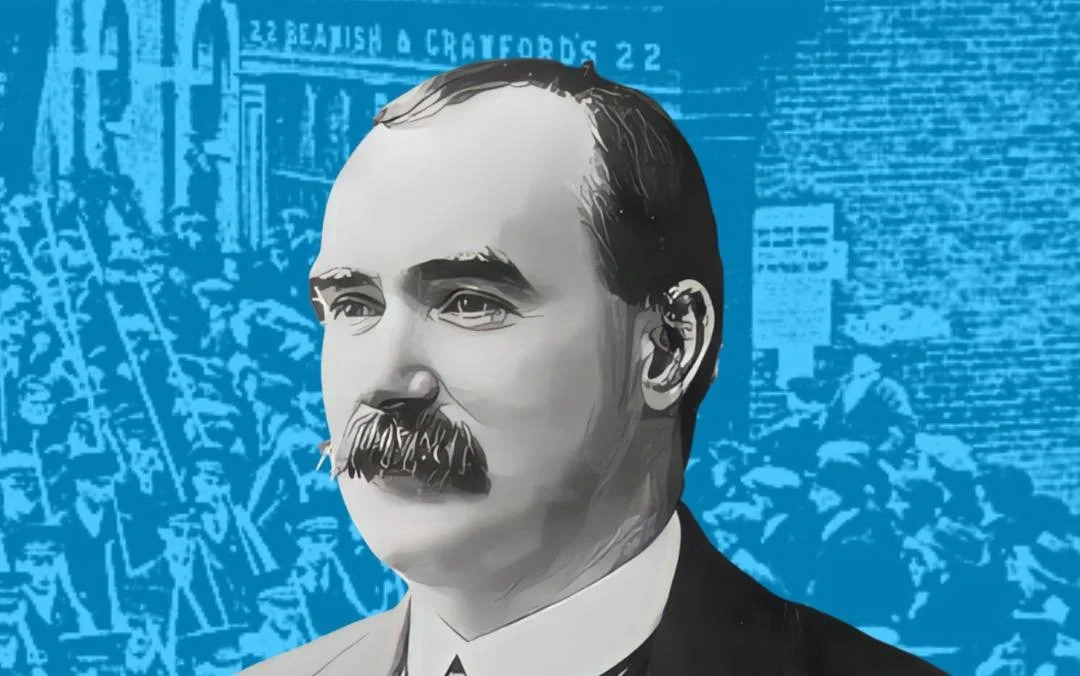The Connolly Archive - 'We Shall Rise Again'
This month’s addition to the Connolly Archive is ‘We Shall Rise Again’, a short piece first published in ‘The Workers’ Republic’ on 25th March 1916 - a month before the Easter Rising began.
In it Connolly casts his eye over the preceding nineteen months, including the outbreak of imperialist war in Europe, the imposition of draconian levels of censorship on the independent press and the voluntary submission to these restrictions by Ireland’s pro-establishment press. Connolly also notes the pro-establishment political parties, both nationalist and unionist, standing-to-shoulder in defence of the British Empire.
In contrast to these forces stood the Irish Volunteer movement, comprised of growing numbers of Irish men and Irish women prepared to take on the might of the British Empire in a strike for Irish freedom.
Irish Volunteers march through Cork City on St. Patrick’s day 1916
We Shall Rise Again
The Workers’ Republic
25th March, 1916
The celebrations of the past week in Ireland are a welcome reminder of the indestructible nature of the spirit of freedom. Who would have thought in August, 1914, that in March, 1916, the principle of a distinct and separate existence for Irish Nationality would evoke such splendid manifestations of popular support and popular approval.
In August, 1914, it seemed to many of the most hopeful of us that Ireland had at length taken its final plunge into the abyss of Imperialism, and bade a long farewell to all hopes of a separate unfettered existence as a nation.
Plans carefully laid for years before had been suddenly and relentlessly put in operation. A party of Parliamentary representatives elected to obtain Home Rule from England, and without any mandate expressing hostility to any other people, suddenly claimed the power and right to pledge the manhood of Ireland to battle with a friendly nation – a nation whose last public act towards Ireland had been an attempt to open the port of Queenstown when shut by English intrigue.
The same Parliamentary Party publicly renounced all hope and desire that this country should ever attain the status of nationhood, and expressly limited the ambitions of Ireland to such freedoms as the British Government would judge to be not incompatible with the British Empire.
Having so limited the claims and renounced the hopes of Ireland this Parliamentary Party consummated its treason by calling upon their fellow countrymen to go out to die, in order to win for Belgium those national rights and powers they had just renounced the right to claim for Ireland.
The public press, the vaunted guardians of public liberty, sold themselves in a body to the Government that had publicly pledged itself not to interfere with an Orange-cum-militarist conspiracy against the liberties of Ireland, and immediately became the foulest slanderers and vilifiers of all who stood by the national cause they had deserted.
The few papers that refused to be bullied, or to be bought, were ruthlessly suppressed by military force.
All over Ireland the public representatives whom a lifetime of political intrigue, vote-hunting and job-hunting had debased and demoralised, yielded at the first onset of the new Irish Imperialism, and joyfully, eagerly, exultantly sold their country and their country’s cause.
August, 1914, and the months immediately succeeding it, were months of darkness and of national tribulation. If the darkest hour is that before the dawn, then the dawn should not be far off, for surely no darker hour could come for Ireland than that we passed through in the beginning of this English war upon Germany.
But slowly, gradually, but persistently, the forces standing for the social and national freedom of Ireland won the people back to greater sanity and clearer visions. Despite imprisonment, despite persecution, despite suppression of newspapers, despite avalanches of carefully framed lies, the truth made headway throughout the country.
The people saw clearer and clearer that nothing had been changed in Ireland, that Ireland was still denied every prerogative that makes for true nationhood, that her interests were still subject to the interests of a rival country, that the Home Rule Act expressly declared for the subjection of Ireland as a permanent condition, that the Redmond-Devlin party had sold the birthright of their country in return for the valueless promise of a Government that did not even keep faith with its own countrymen or women, that the British Empire and the freedom or prosperity of the Irish people were two things that could not exist together in Ireland, and that therefore one or the other must forever and utterly perish.
All through Ireland last week the manhood and womanhood of the nation have gladly, enthusiastically proclaimed their realisation of those truths. This 17th of March will be forever memorable for that reason. The magnificent parades of Volunteers under arms, the overflowing meetings, the joyous abandon of the Irish gatherings of all descriptions, and above all the exultant rebel note everywhere manifest, all, all were signs that the cause of freedom is again in the ascendant in Ireland.
The Cause is not lost, this 17th of March has assured us that despite all the treasons of all the traitors Ireland still remains as pure in heart as ever, and though Empires fall and tyrannies perish
We Will Rise Again.


